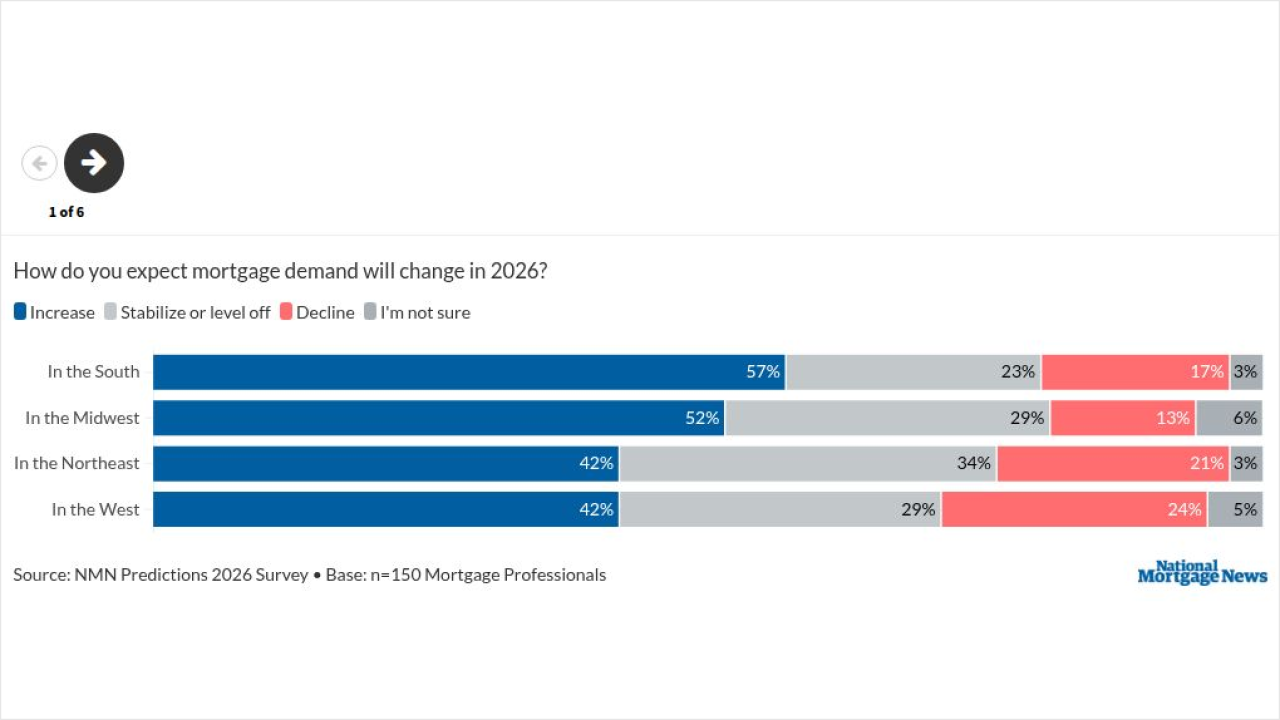Banks, lenders, servicers, brokers and vendors are laying off staffers
"I think there's still lenders out there that, unfortunately, are using hope as a strategy and having to come to terms with the reality that we're in and likely will be in for some time," said Phil Shoemaker, president of originations at Homepoint.
Lenders are promoting products specifically structured to ease the burden of volatile rates and still elevated home prices on borrowers. Wholesale players also see an opening in
Mortgage executives, including some whose firms undertook layoffs this year, spoke to National Mortgage News about their approach in capping off a difficult year.
Locking rates amid volatility
"I've never heard more borrowers speak about Fed meetings than ever before," said Greg Schwartz, co-founder and CEO of fintech lender Tomo Networks. "We were all biologists and virologists a moment ago with the pandemic, and now it seems like everyone's a housing economist right now studying mortgage interest rates. So there's a greater savviness, about the underlying drivers."
Tomo's Lock and Shop product was a "phone ringer" as the firm had its second-best month ever in September, co-founder and CEO Greg Schwartz said. The lender's Lock and Shop program offers 90 or 120-day rate locks for $450, and a one-time rate adjustment option once an offer on a home has been accepted if the rate declines.
Temporary rate lock programs for prospective buyers have existed before the market's latest cycle but non-traditional lenders are introducing the product this season. Cash offer lender Knock last month announced a Lock and Shop program in which clients can lock rates for 60, 75 or 120-day periods to avoid the rate shocks that come with various economic reports shifting rates in very short periods of time, said Rob Foos, the firm's director of sales.
Other lenders are revamping and adding onto their programs. Rocket Mortgage this summer announced a
Buydowns that offer temporary relief
A 2-1 buydown, for example, allows a borrower to shave 2% off their rate in the first year and 1% lower in the second, while a 1-0 buydown cuts 1% off the loan's first year before reverting.
"However, understand that borrowers are still qualified from a debt-to-income ratio perspective at the full payment," said Shashank Shekhar, founder and CEO of InstaMortgage, which released a buydown product at the end of the summer.
Lenders said the product, a temporary form of buying discount points, makes sense for borrowers who believe they'll secure a refinance opportunity in the near future. As mortgage rates approach 7%, the rate slice with a buydown becomes more significant, Shekhar said.
Some lenders, like United Wholesale Mortgage, have begun offering the 2-1 and 1-0 buydowns, while others are offering variations of rate relief. Rocket Mortgage's
Lenders said homebuilders are also offering buydowns as part of concessions to draw buyer interest as
"Maybe they provide a little bit of a pickup, like miniscule," he said. "The reality is... I really don't see a lot of product options out there. I think it really is more about the channel."
Cash offer products are still on the table
Over the summer, cash remained relevant as a counter to elevated rates. In July, cash offers accounted for nearly one-third of U.S. home purchase, matching an all-time high share from February,
Home price growth slowed in the third quarter
"Cash is always king, regardless of the market cycle that we're in, whether it's a buyer's market or a seller's market" said Foos.
The fintech last year introduced a Knock Go guaranteed offer program in which the company provides a cash-backed conventional mortgage with a closing guarantee in which it will fund a loan if it's not clear to close. It's one of several variations of cash offer products offered largely by fintechs. Their enduring appeal has prompted lenders like Guild Mortgage, Homepoint
Non-bank lender New American Funding rolled out its Buyer Accepted cash offer program last year to help borrowers compete with institutional investors, said co-founder and CEO Rick Arvielo. Now, the product serves an even greater function; Arvielo pointed to a University of San Diego study published earlier this year which found cash buyers in the past decade saved 11% in purchases compared to mortgage borrowers.
"The real estate community and the lending community have to get their minds around the fact that the presentation is now different," he said. "It's not about winning the house, it's about getting a better deal on the house. And then I think you're gonna see the cash transactions proliferate."
More ARM rollouts, though their advantages are waning
Lenders think borrowers won't stray from the products, but aren't as keen on the ARM advantage today. Tomo Networks, a digital lender formed in 2020, is going to offer an ARM product in the near future, co-founder and CEO Greg Schwartz said, but pricing advantages and customer confusion prompt some hesitancy.
"Until a few weeks ago, the advantage to an ARM was like an eighth of a point," he said. "So it wasn't enough for most folks to take on what is a more complicated and sometimes intimidating product."
The advantage of ARMs can be determined by the 10-year Treasury yield, where an inversion, in which the yield is lower than shorter-term instruments, makes the product uncompetitive against conventional mortgages assessed off the 30-year Treasury yield, experts said. Last week the 10-year was 50 basis points below the 2-year bond, S&P Global Market Intelligence reported, an inversion which is also an indicator of a
Shekhar of InstaMortgage said the firm's clients continue to ask for ARMs in pursuit of any rate relief, no matter how short-term. Lenders said the products also give borrowers the option to pursue a refinance in the near-future should rates recede.
"Short term projections are always hard to make," he said. "But to say, will the rates in the next 5 years be lower than 7% at least once? Chances are yes, of course no one knows the future."
Independent mortgage banks also aren't going to offer ARMs as much as depositories, which have access to cheap capital to price the products differently, said Shoemaker.
"From a portfolio standpoint, it's a really, really attractive thing for them, they can get a decent return and they're also using it as a new customer acquisition strategy on the depository side," he said.
Wholesale lenders trying to seize the moment
"Look at just the 2021 data right now and we now know it's up to $9,400 per loan cheaper, right, that they're ultimately getting through originators wholesale," Shoemaker said.
United Wholesale Mortgage in June said it would shave
The wholesale rush is apparent in mortgage employment figures. Overall mortgage industry employment in August was on the decline but
Meanwhile the sector has undergone significant upheaval, as lenders both
"The bigger players, primarily Quicken and UWM, have the wallet to make the plays that they're making," said Arvielo. "I think that their ultimate goal is to chase all the other wholesale vendors out of the business and I think it's working."
Shoemaker said the wholesale exits are coming from multichannel lenders who are choosing to exit the channel because of its more variable cost structure, compared to retail which is more difficult to wind down because of different staffing structures and physical leases.
"I want more wholesale lenders in the channel," he said. "I think that's what makes the channel special and gives it the advantage against retail, but unfortunately, I think you will see the nature of what we're going through there. There has to be less capacity everywhere and that does include wholesale."




